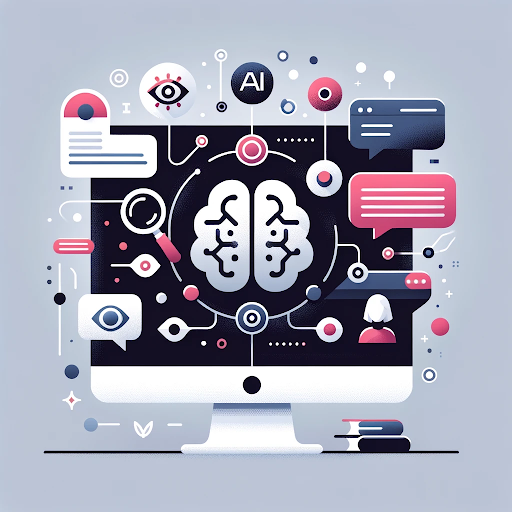The Role of AI in Smart Web Design Interactions
April 21, 2023

In the rapidly evolving digital landscape, the integration of Artificial Intelligence (AI) into web design has emerged as a game-changer, revolutionizing how users interact with websites. This integration is not just about automating tasks; it’s about creating smarter, more intuitive experiences that engage users in unprecedented ways. As we delve into the world of AI-enhanced web design, it becomes clear that the future of website development lies in leveraging AI to create more personalized, efficient, and engaging digital experiences.
The Importance of AI in Web Design
Understanding why is web development important in today’s digital age is the first step in recognizing the value AI brings to the table. Web development is crucial because it creates the platform for businesses to communicate with their audience, showcase their products or services, and facilitate transactions. With the integration of AI, web development transcends traditional boundaries, offering a more dynamic, responsive, and personalized user experience. AI algorithms can analyze user behavior, preferences, and interactions, enabling websites to adapt in real-time to meet the needs of each visitor.
Starting with AI Integration
For those pondering where to start with web development that incorporates AI, the journey begins with identifying the specific goals you aim to achieve through AI integration. Whether it’s improving user engagement, increasing conversion rates, or enhancing personalization, setting smart goals for website development is essential. These goals should be Specific, Measurable, Achievable, Relevant, and Time-bound, ensuring that the integration of AI into your web design is focused and effective.
Enhancing User Interactions with AI
AI’s role in smart website development is multifaceted, encompassing everything from chatbots and virtual assistants to personalized content delivery and predictive user behavior analysis. By understanding and anticipating the needs of users, AI can facilitate interactions that feel natural, intuitive, and remarkably human. This level of personalization not only improves the user experience but also significantly boosts engagement and satisfaction.
Driving Smart Growth in Web Development
The concept of smart growth development in the context of web design refers to the strategic incorporation of AI technologies to foster a more adaptive, responsive, and user-centric online presence. This approach leverages AI’s capabilities to analyze vast amounts of data, identify patterns, and make informed decisions that enhance the website’s performance and user engagement. By adopting a smart growth mindset, businesses can ensure that their web development efforts are not just keeping pace with technological advancements but are also aligned with the evolving expectations of their audience.
The integration of Artificial Intelligence into web design marks a significant leap forward in how we create and interact with digital spaces. AI opens up a world of possibilities for creating websites that not only meet the needs of users but anticipate and adapt to those needs in real-time. As we continue to explore the potential of AI in web design, it becomes evident that the future of digital interactions will be shaped by our ability to leverage this technology to create smarter, more engaging, and more personalized user experiences. In this dynamic digital era, the integration of AI into web design is not just an option; it’s a necessity for anyone looking to stay ahead in the game of digital engagement and user satisfaction.
Are you ready to transform your website into a dynamic, AI-powered platform that captivates and engages your audience like never before? Dive into the future of web design with our cutting-edge AI integration services. Contact Jacksonville Webdesign today to discover how we can elevate your online presence, enhance user interactions, and drive your digital success forward. Let’s make your website not just smarter, but a step ahead in the digital realm. Your future-proof web journey starts here!
Frequently Asked Questions
- How does AI improve web design?
AI improves web design by enabling personalized user experiences, automating customer service through chatbots, optimizing site layouts based on user behavior, and providing actionable insights through data analysis. This leads to more engaging and efficient websites that meet the specific needs of each visitor.
- What are the first steps in integrating AI into my website?
The first step in integrating AI into your website is to clearly define your objectives, such as improving user engagement, personalizing content, or automating responses. Next, consider the AI technologies that best suit your goals, such as machine learning algorithms, natural language processing, or predictive analytics, and seek professional guidance to implement these solutions effectively.
- Can AI integration help with SEO?
Yes, AI integration can significantly help with SEO by analyzing user behavior to optimize content and site structure, improving site speed through intelligent caching, and personalizing user experiences to increase engagement and reduce bounce rates. AI can also automate the creation of meta tags and content adjustments to better match search intent.
- Is AI web design expensive?
The cost of AI web design varies depending on the complexity of the AI technologies implemented and the specific goals of the website. While initial investments may be higher, the long-term benefits of improved user engagement, higher conversion rates, and increased efficiency often justify the cost. Many solutions are scalable, allowing businesses to start with basic AI integrations and expand as needed.
- How does AI ensure privacy and security on websites?
AI can enhance privacy and security on websites by detecting and responding to suspicious activities in real-time, automating compliance with data protection regulations, and personalizing privacy settings for users. However, it’s crucial to work with reputable AI service providers and adhere to best practices in data security and privacy to protect user information effectively.
